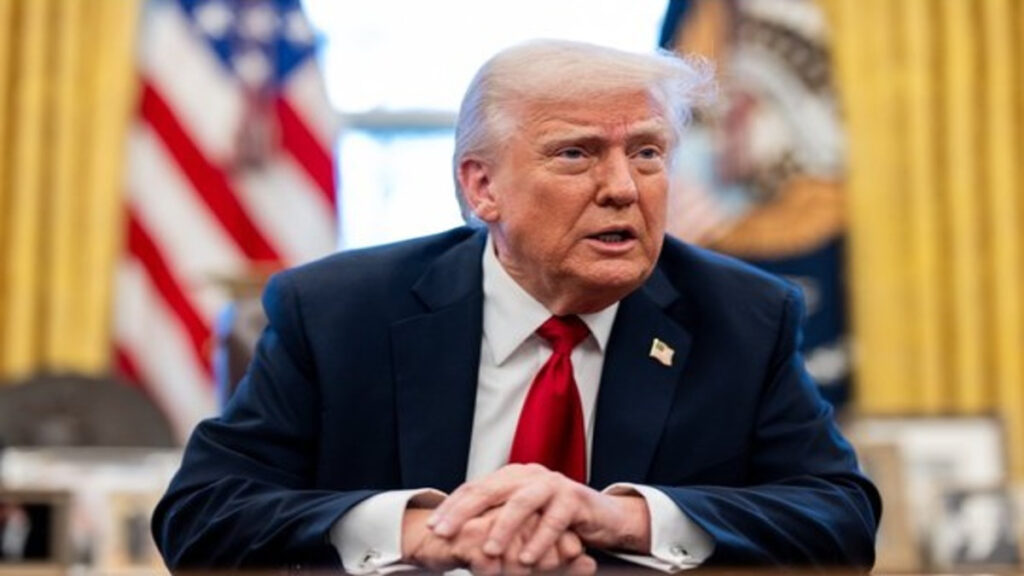
Pic Source and Credits: AIR News
Washington D.C., July 13 (TND): In a major shift in U.S. trade policy, U.S. President Donald Trump has announced a sweeping 30% tariff on imports from Mexico and the European Union, set to take effect on August 1. This bold move has already sparked intense global debate, reigniting discussions around protectionism, global supply chains, and U.S. diplomatic relations with its major trading partners.
The announcement was made via a statement from Trump’s campaign team, which cited “unfair trade practices” and “massive trade imbalances” as key justifications for the imposition of tariffs.
A Sharp Return to Trump’s Trade Doctrine
This 30% tariff on imports from Mexico and the European Union is consistent with Donald Trump’s earlier “America First” trade philosophy that dominated his presidency from 2017 to 2021. During that term, Trump took similar action against Chinese imports and also renegotiated trade deals like NAFTA, which became the USMCA.
Speaking from his campaign headquarters, Trump emphasized the need to protect American manufacturing and reduce reliance on foreign products, particularly in automotive, agricultural, and pharmaceutical sectors. “We can no longer allow foreign nations to exploit America’s open market while closing theirs to our goods. The 30% tariff is just the beginning,” Trump said.
What the Tariff Means for Mexico and the EU
Impact on Mexico
The 30% tariff on imports from Mexico could severely disrupt existing trade flows, particularly in the automobile and agricultural industries. Mexico is one of the U.S.’s largest trading partners, with bilateral trade exceeding $860 billion in 2023. Key Mexican exports to the U.S. include cars, avocados, electronics, and machinery.
Industry leaders and economic analysts in Mexico have warned of potential factory shutdowns, job losses, and retaliatory measures if the tariffs proceed. Mexican President Andrés Manuel López Obrador has called the tariffs “aggressive and unnecessary,” and has urged for urgent diplomatic dialogue.
Impact on European Union
The 30% tariff on imports from the European Union is equally consequential. The EU exported goods worth over $500 billion to the U.S. in 2023, including luxury cars, industrial machinery, pharmaceuticals, and wine. The automotive sector, particularly German manufacturers like BMW, Volkswagen, and Mercedes Benz, will be directly affected.
European Commission President Ursula von der Leyen condemned the move, calling it “a hostile act that undermines decades of transatlantic cooperation.” She added that the EU is preparing to file a formal complaint with the World Trade Organization (WTO) and may consider reciprocal tariffs.
Economic Ramifications in the U.S.
While Donald Trump argues that the 30% tariff on imports from Mexico and the European Union will boost domestic production, economists are warning of short term inflation and price hikes. American consumers could feel the pinch in prices of cars, groceries, and electronics as import costs rise.
Inflation Concerns
Tariffs function effectively as taxes on imported goods. If companies pass these additional costs to consumers, the prices of everyday products could spike, especially for lower-income households.
Supply Chain Disruptions
Businesses dependent on components from Mexico or the EU, such as U.S. automakers and tech firms, might face supply chain disruptions. They may need to find alternative suppliers or absorb higher costs, ultimately impacting competitiveness.
Republican and Democratic Reactions
Support from Trump Allies
Republican lawmakers aligned with Trump have welcomed the move, stating it shows strong leadership and a commitment to American workers. Senator Josh Hawley (R-MO) tweeted, “Trump is standing up for working class Americans. We need to rebuild U.S. manufacturing and stop the trade exploitation.”
Criticism from Opponents
However, opposition has come from both Democrats and free-market conservatives. Senator Bernie Sanders (I-VT) criticized the 30% tariff on imports from Mexico and the European Union, stating, “This is another tax on the poor disguised as patriotism.”
Even within Trump’s own party, there are divisions. Former economic adviser Larry Kudlow said, “Tariffs are taxes. This will raise prices and hurt our economic recovery.”
Potential Legal Challenges and WTO Response
Experts believe that the 30% tariff on imports from Mexico and the European Union may not withstand international scrutiny. The tariffs are likely to face legal challenges under WTO rules, which prohibit arbitrary tariff hikes without due process and consultation.
Trade lawyers point out that if the U.S. cannot justify the tariff as a national security issue under Article XXI of the General Agreement on Tariffs and Trade (GATT), it could face severe sanctions or counter tariffs from affected countries.
Business and Market Reactions
Wall Street Jitters
The U.S. stock market responded negatively to the announcement. The Dow Jones Industrial Average fell by over 600 points, and shares of automotive and retail companies took significant hits. Companies like Ford, General Motors, Walmart, and Target are seen as particularly vulnerable.
Corporate Pushback
Several major U.S. business groups, including the U.S. Chamber of Commerce and the National Association of Manufacturers, issued strong rebukes. “These tariffs will increase costs for American consumers and businesses alike. We urge President Trump to reconsider,” said a Chamber spokesperson.
Retaliation Looms
Both Mexico and the European Union are preparing retaliatory measures. Mexican officials hinted at targeting American corn and soy exports, while EU sources mention levies on U.S. tech companies and luxury goods.
Such tit for tat actions could escalate into a full blown trade war, reminiscent of the U.S.-China tariff battle under Trump’s earlier presidency, which cost billions in global trade losses.
What Happens on August 1?
Unless reversed or blocked through diplomatic or legal channels, the 30% tariff on imports from Mexico and the European Union will take effect on August 1, 2025. U.S. Customs and Border Protection (CBP) is expected to issue formal procedures and tariff codes for implementation in the coming days.
Conclusion
The imposition of a 30% tariff on imports from Mexico and the European Union marks a dramatic return to protectionist trade policies under Donald Trump’s leadership. While intended to protect American jobs and reduce trade deficits, the move risks inflaming international tensions, disrupting supply chains, and increasing consumer costs.
As August 1 nears, all eyes will be on the diplomatic responses from Mexico, the EU, and domestic stakeholders across the U.S. economy. Whether this bold gamble pays off or backfires remains to be seen.
Summary
U.S. President Donald Trump has announced a 30% tariff on imports from Mexico and the European Union, effective August 1, 2025. This move is part of Trump’s revived “America First” trade policy aimed at protecting U.S. manufacturing and addressing trade imbalances. The tariffs are expected to hit key industries like automotive, agriculture, and pharmaceuticals in both regions.
Key highlights:
- Mexico and the EU are major U.S. trading partners, and the new tariff threatens to disrupt trade worth over $1.3 trillion combined.
- The tariffs could raise prices for American consumers and disrupt supply chains for U.S. industries.
- Mexico and the EU have condemned the move and are preparing retaliatory tariffs.
- Global markets reacted negatively, with U.S. stocks falling and businesses warning of inflation.
- The EU may file a WTO complaint, and legal challenges are likely.The tariff will come into force on August 1, unless reversed through diplomacy or litigation.
This action revives trade war fears and raises serious questions about the future of global commerce under Trump’s leadership.
Stay Connected with The News Drill for expert insights on U.S. trade policy and global economic impacts. Stay informed. Stay updated. Stay Ahead.
Contact us at: contact@thenewsdrill.com
Got a scoop or tip on this story? Send it to editor@thenewsdrill.com or visit our Contributor Page.
Follow all developments on U.S. tariffs and trade diplomacy exclusively at The News Drill (TND).
















